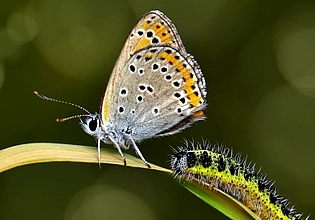Topic in Focus
Biodiversity – Why We Need Diversity of Species

Image: Adobe Stock / blackdiamond67
Today, there are 60 percent fewer vertebrates living on earth than in 1970. In Germany, the agricultural landscape's typical bird species declined by more than 36 percent between 1998 and 2009. In its “Global Assessment Report on Biodiversity and Ecosystem Services” dated May 2019, the World Biodiversity Council (IPBES) warns of the imminent further loss of up to one million species worldwide in the coming decades. This decline will lead to the loss of goods, services, and values for humankind - it is a threat to our entire ecosystem.
What is biodiversity, and why do we need it?
The United Nations defines biodiversity as the diversity among all living organisms, habitats, and ecosystems on land, in freshwater, in the oceans, and in the air. However, this biological diversity is under threat. In Germany, almost one-third of all animal and plant species are considered endangered. The number of flying insects has declined by at least 75 percent in the last thirty years, and about two hundred species of flowering plants are on the “Red List” of endangered plants in Germany.
“The most famous endangered plant is arnica.”
However, Germany does not have - unlike other European countries - an official and nationwide standardized monitoring system for biological diversity. The working group “Biodiversity in Agricultural Landscape” has compiled a comprehensive overview of the decline in species from various sources. Accordingly, a sharp decline can be documented for Germany, even in nature reserves. The causes thereof root in the interaction of many factors, such as species-poor arable farming, pesticides, and monocultures. Overall, the main problem is land use change, which destroys animal and plant habitats, and with it our basis of life.
Diversity is our livelihood
Animals and plants are essential to the earth's ecosystem. Without them, we could not exist on our planet. Biodiversity supplies food, provides active ingredients for medicines, is used for recreation, and plays a vital role in climate regulation. Species-rich forests and meadows can absorb more carbon and thus extract the greenhouse gas carbon dioxide from the atmosphere. Different species also occupy different niches in the ecosystem. If species are missing, ecological cycles are disrupted. If insect species become extinct, for example, it affects the birds feeding on these insects, as well as the pollination of plants and consequently, the harvest. The decline in biodiversity is, therefore, also a threat to humans.
“We know that biodiverse ecosystems are more stable. Let's say we have a drought one year and another where it rains a lot, where it is cold or unusually warm, a meadow with a variety of thirty or forty different species of plants will always have some that cope well with the prevailing conditions. We also know from long-term studies that biodiverse ecosystems are much more reliable in the long term to provide biomass for the harvest.”
“When certain species are missing, less pollination occurs and that means less yield.”
Scientists tried to calculate these insect “services” and came to the following conclusion: insects pollinate three-quarters of all crops worldwide and thus perform a service valued at 500 billion US dollars a year. Nature also serves people as a source of recreation. In its status report from May 2019, the World Biodiversity Council also emphasizes nature's contribution to people's well-being. A diverse nature improves mental and physical health, not least through the provision of a wide variety of food.
“Health is also about diversity.”
